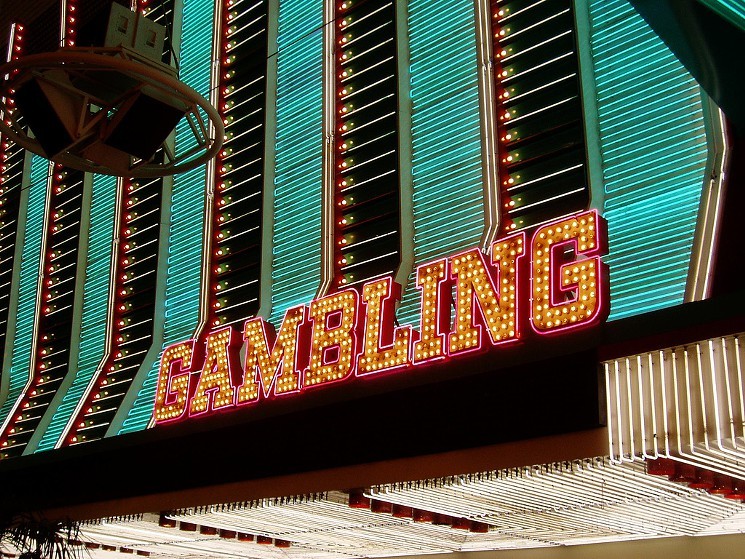A good read from Texas Monthly about how Miriam Adelson tried to throw a bunch of money around and hire every lobbyist in the state to get casino gambling on the ballot, only to run into a different billionaire throwing his own pile of money around to stop her.
Photo by Joel Kramer via Flickr creative commons
Sands is not the first to try to strong-arm legislators and citizens into legalizing casino gambling. Native American tribes, horse-track owners, and other gambling interests have tried for decades, only to get repeatedly tripped up by their mutually destructive avarice and the enduring power of religious conservatives. But no company has played hardball like Sands.
In Austin, the business has 104 lobbyists—43 more than AT&T, the company with the second most. The Sands team includes at least eight former legislators, Karl Rove’s wife, and chiefs of staff to the two previous Speakers of the House, at a cost of between $5 and $10.4 million, according to ethics disclosures. Since January 2024, Adelson has pumped $13.2 million into two political action committees, Texas Sands PAC and Texas Defense PAC, which in turn spent lavishly in recent election cycles.
Texas’s political system runs on cash. But the Vegas money seemed less about well-placed bets than about a show of force—a slot machine spewing money all over the casino floor. When state Representative Matt Shaheen, a right-wing Republican from Plano, publicly swore to kill gambling legislation and linked casinos to sex trafficking, one of Adelson’s PACs began running ads in his district accusing him of being a “moderate” who “voted against 18,000 good jobs.” The aggressive move provoked a behind-the-scenes rebuke from Republicans.
But Abboud is hardly chastened. “If they don’t like what happened to Shaheen, you better get used to it,” he said. “If you cross the line and you continually lie about the company and the family, then we’re going to hold you accountable. And if they don’t like that, too bad—it’s not going to change, and it’s only going to amplify over time.”
There is little doubt about what Sands wants. It sold its last U.S. property in 2022. Its six casinos are all in Asia. Texas is the company’s path back home. In 2020, Abboud told a conference that the state was “the biggest plum still waiting” to be plucked “in the history of hospitality and gaming.” Worth an estimated $32 billion, Adelson is betting that limitless cash can overcome any opposition. It’s a long game, with immense profits as the reward, one that her most ardent enemies admit may pay off someday.
And yet, though Texas lawmakers may be for sale, there are other buyers, other billionaires—many of them homegrown. As ever, there’s Tim Dunn, the Midland oilman who presides over an empire of pressure groups, PACs, and propaganda outlets pushing the Texas GOP to the right. It was the Dunn-affiliated Texans for Fiscal Responsibility that provided the organizing muscle for the Irving protesters, while his news outlet, Texas Scorecard, poured on with articles attacking Sands. Dunn’s PACs pumped money into candidates with anti-gambling bona fides.
Politicians are torn, then—between a Vegas sin merchant who promises to share some of her fortune with those willing to play her game and a Texas-born Christian nationalist with his own long-term vision for the state and the funds to make it a reality. Irving was a live experiment: Were Texans ready for legal gambling? How would a local community react to a casino proposed in its backyard rather than the abstraction of a “destination resort” somewhere in the state? In forcing the issue, Sands reignited one of the oldest struggles in Texas, the battle between vice and virtue, licentiousness and conformity, high rollers and holy rollers.
“I think [Abboud] came in, he stomped around, and thought this is like anywhere else,” said Mike Lavigne, a bald, fast-talking poker fanatic who has mainly worked for horse-track owners who want to expand legal gambling. “I’m not some kind of Texas exceptionalist, except for when I realize it isn’t like any other f—ing place.”
It’s a long story, with a lot of information about the history of gambling and people’s attempts to legalize it and keep it illegal. It will never cease to amaze me that Adelson thought that the problem was that no one had spent enough money or hired enough lobbyists to make it happen. Though to be fair, a bill did pass the House in 2023, and she shoved enough money in Greg Abbott’s pockets to get him to mumble something vaguely supportive about the effort. As I’ve been saying for the last 47 years or so, none of that will get you past Dan Patrick. Maybe one of these days someone with that kind of juice will get the bright idea to try to un-elect Patrick. But as long as it’s one asshole wingnut billionaire versus another asshole wingnut billionaire fighting over exclusive control of the Republican Party and the Legislature it enables, leave me out of it.


Remember, all the licenses for destination casinos and sports gaming in the Adelson/Fertitta backed bills are likely spoken for, and none of them are likely to be controlled by African Americans, LGBTs, or Democrats. These plans drain money from our cities and sell these licenses at ripoff prices to Republican insiders.